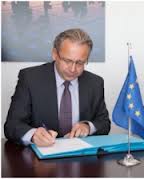European spectrum war flares up again
The EBU (European Broadcasting Union) has stepped up its campaign to preserve radio spectrum for future digital terrestrial services rather than 4G mobile networks by lobbying European Commission vice president Neelie Kroes. EBU president Jean-Paul Philippot and director general Ingrid Deltenre told Kroes that the DTT platform is essential for efficient media delivery, and must be preserved for future generations.
In its presentation, the EBU delegation explained that DTT is available to 275 million people in the EU and delivers 2000 TV channels, including national, regional and local services.

“Any decision regarding the 700MHz band should focus on its impact on EU citizens and carefully assess the costs and benefits,” Philippot said. “Public service media organizations need a clear, long-term roadmap for the 700MHz band and the future of DTT in order to support successful broadcasting business models and to ensure further investment in innovation and European content.”
Philippot could have cited the case of Germany’s largest private free-to-air broadcaster RTL Deutschland, which has just announced that it will stop distributing over DVB-T in the country on Dec. 31, 2014, with the exception of its broadcasts in Munich, which will already end on May 31, 2013. This will affect terrestrial distribution of RTL, Vox, Super RTL, RTL II and, for Berlin only, n-tv.
RTL Deutschland said that it still has faith in digital terrestrial broadcasting, but that the current conditions in Germany prohibit long-term planning. RTL pointed out that without guarantees from the German federal government that it will keep the current terrestrial frequency spectrum available for broadcasting beyond 2020, it is too risky for the broadcaster to commit the investment required to keep transmitting over DTT.
This explains the EBU’s urgency as its campaign to preserve DTT spectrum will be fatally undermined if more major broadcasters cease transmissions. The arguments in Europe have rumbled on all year after coming to the boil in January 2012 during the World RadiocommunicationConference 2012 (WRC12) in Geneva, when African and Middle Eastern countries unexpectedly called for a further transfer of spectrum from terrestrial TV to mobile services in their radio spectrum area, which includes Europe.
Unlike Europe, many countries in Africa and the Middle East have not deployed terrestrial TV services significantly, and want to devote as much spectrum as possible to mobile telephony, which will also deliver TV services in some cases. Cellular deployments are in a few countries more advanced than in Europe, with Kenya for example already using mobile phones widely as remote payment devices. It was not surprising then that during WRC12, these countries exerted pressure on delegates to allocate the 700MHz band between 694MHz and 790MHz to mobile services.
But the EBU indicated that this allocation will cause considerable problems in Europe, where the 700MHz band is widely used for terrestrial broadcasting, often with long-term licensing arrangements in place. Yet WRC12 went further by suggesting that at the next 2015 conference, the possibility of additional spectrum allocations to mobile services will be considered. These will include International Mobile Telecommunications (IMT) to facilitate the development of terrestrial mobile broadband applications in the frequency band 694MHz to 790MHz. This issue has been placed on the WRC-15 Agenda.
Since then, there have been some hints at compromise, with the EBU arguing for a careful review of spectrum in light of advances in technology, as well as changing cultural and political objectives, before committing to an approach that would dictate the fate of both mobile and terrestrial services for years to come. The argument here is that through emerging strategies for sharing spectrum and using it more efficiently, it will be possible to meet the conflicting needs of all countries in the region.
RTL itself supports this line, indicating that it wants an industry-wide plan for DTT in place, and a consensus to migrate to the more efficient second generation DVB-T2 currently being deployed in some European countries. Yet 2013 has begun with little more sign of agreement between the broadcasting and mobile telephony camps than a year earlier, and with the EU still to come off the fence. In response to the EBU delegation, Commissioner Kroes, who is in charge of the Digital Agenda for Europe, said, “The EU must agree on a common position on the 700MHz band that balances the stakeholders’ interests, shows vision and serves the internal market. Spectrum is a precious, limited resource, and it is essential that we consider all sides in every decision.” This merely reiterated the stance taken by the EU through 2012.
Get the TV Tech Newsletter
The professional video industry's #1 source for news, trends and product and tech information. Sign up below.
